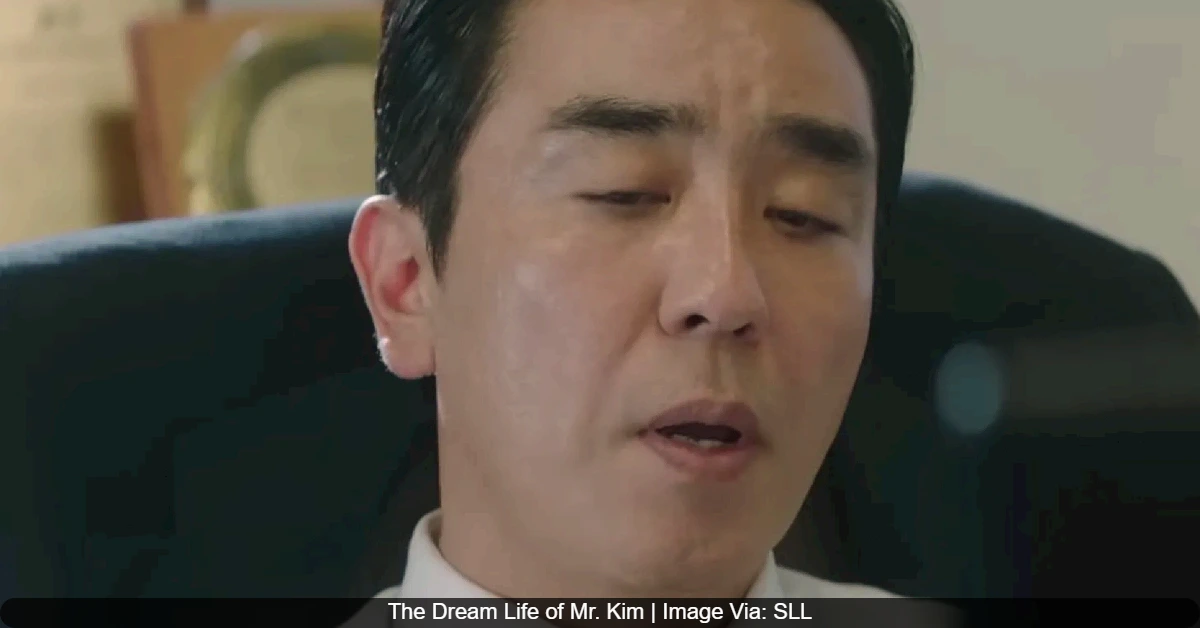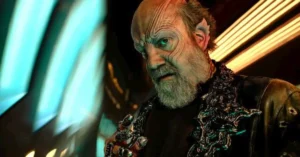The Dream Life of Mr. Kim introduces viewers to Kim Nak-su, a man who appears to have achieved the Korean dream but is teetering on the brink of losing everything. The Netflix and JTBC drama, starring Ryu Seung-ryong, begins with a story of corporate ambition, family strain, and the fragile nature of success.
Who Is Kim Nak-su?
Kim Nak-su is a general manager at a telecommunications company called ACT. He has worked there for 25 years and owns a home in Seoul, two markers of supreme success in Korean society. Despite his achievements, Nak-su is deeply insecure, competitive, and obsessed with status. He constantly compares himself to others, from his junior colleague’s luxury car to his boss’s fancy office.
His behavior stems from childhood. A flashback shows a young Nak-su excited about becoming class vice-president, only to have his older brother crush his joy by saying second place is nothing to celebrate. This established a lifelong pattern where comparison steals his happiness. In the present, this manifests as resentment toward a successful friend who earns millions in rent and jealousy toward a younger, more popular coworker also in the running for a promotion.
A Troubled Home Life
Nak-su’s personal relationships suffer from his single-minded focus on status. He belittles his wife, Ha-jin, and dismisses his son Su-gyeom’s ambitions. He presents himself as a perfect provider, but his family knows the truth. They remind him that buying their valuable apartment was actually Ha-jin’s idea, a fact he conveniently ignores.
He pressures Su-gyeom to join a student marketing program at his company to build his resume. However, Su-gyeom is his father’s opposite—a relaxed young man who wants to find his own path. He reconnects with an old friend, Han-na, who introduces him to a startup called “Jealousy, My Strength.” The startup’s arrogant CEO offers Su-gyeom a job as “Chief Destruction Officer,” creating a rift with his father who disapproves of the unconventional role.
A Crisis at Work
The drama establishes ACT as a ruthless company. Nak-su’s friend and colleague, Heo Tae-hwan, who started at the company with him 25 years ago, is being pushed out. Tae-hwan is set to be transferred to a remote role involving work in confined spaces, which triggers his claustrophobia. He begs Nak-su for help, but Nak-su, fearing it might hurt his own promotion chances, coldly refuses. He tells Tae-hwan he is embarrassed by him.
This decision has immediate consequences. Shortly after their conversation, Tae-hwan attempts to take his own life in the company parking lot. The company director orders Nak-su to handle the situation quietly to avoid scandal. While in the hospital, Tae-hwan receives news of a slightly better transfer and compensation, but his wife breaks down, questioning if this will be their life forever. The incident serves as a stark warning about the human cost of corporate brutality, one that Ha-jin later says was a wake-up call for her.
The Cost of a Single Moment of Glory
A significant moment in the early episodes occurs during a company golf game. Nak-su achieves a rare hole-in-one, impressing his bosses and clients. The success makes him confident he will get the promotion. He celebrates by spending extravagantly—buying a expensive golden souvenir ball, treating everyone to a costly dinner, and paying off golf staff, all because he did not have hole-in-one insurance.
This spending spree happens while his wife is at home attending retirement planning classes, worried about their future savings. Nak-su is living in the moment, fueled by professional triumph, while Ha-jin is practically planning for their future. The scene highlights their differing priorities and Nak-su’s short-sightedness.
The Family Dinner That Broke Everything
The tension in the Kim household comes to a head during a family dinner at a Chinese restaurant. Nak-su starts the evening by making a reservation error and angrily blaming the staff, embarrassing his family. At the table, Su-gyeom brings up the job offer from “Jealousy, My Strength.” Nak-su is immediately dismissive and arrogant, leading Su-gyeom to storm out, stating he is embarrassed to have Nak-su as a father.
Ha-jin then shares her own news: she has signed up to take the real estate exam. She explains that Tae-hwan’s situation made her realize she needs her own career. Instead of supporting her, Nak-su’s ego is wounded. He suggests she take up hobbies like “doll-making or bouquet arrangements” instead. The suggestions hurt her, making it clear he does not see her as an equal partner with professional ambitions. The dinner ends with Nak-su alone, his family having walked out on him.
Actor Ryu Seung-ryong commented on his character, saying, “He carries so much on his shoulders — family, society, reality, work — and has to look both up and down. The way he tries to give himself value through petty things is both funny and sad.” He described Nak-su as a “kkondae” (an old-fashioned, overbearing adult) but also a figure of tragedy who is hard to hate completely.
A Professional Mistake Looms
Beyond his personal failures, Nak-su makes a critical error at work that threatens his career. His team discovers an ambiguity in a contract for the Yangpyeong Dream Cultural Center. The service was quoted based on a high-speed internet network that is not yet available in the area. Instead of addressing the problem, Nak-su decides to push ahead, hoping the company can get away with it for a few months. This reckless decision, made to avoid delays and look good for his promotion, sets the stage for a major professional downfall.
The first two episodes paint a detailed portrait of a man who has built his identity entirely on external validation. Kim Nak-su is on a path that is destroying his friendships, alienating his family, and endangering his career, all while he remains blindly convinced of his own superiority.
Also Read: The Dream Life of Mr. Kim Episodes 3-4: What Happens After Everything Falls Apart?


























